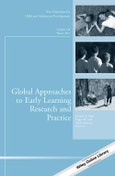This issue features presentations of leading international scientists, representatives from key governmental and non-governmental organizations, and others working with programs in the developing world and disadvantaged populations. The presentations describe the goals, existing challenges, and potential approaches to providing evidence-based programs to young children in rural, remote, and poverty stricken areas. Topics covered include:
- the state of early childhood in low and middle income nations,
- programs that have shown some success, and
- innovative research approaches that have been often considered unfeasible in these contexts.
This is the 158th volume in this Jossey-Bass series New Directions for Child and Adolescent Development. Its mission is to provide scientific and scholarly presentations on cutting edge issues and concepts in this subject area. Each volume focuses on a specific new direction or research topic and is edited by experts from that field.
Table of Contents
1. Global Approaches to Early Learning Research and Practice: An Introduction 7
Kenneth R. Pugh, Peggy McCardle, Annie Stutzman
This paper introduces the issue, highlighting the importance of early
childhood development and learning.
2. State of Early Child Development Research, Practice, and Policy for Most Vulnerable Children: A Global Perspective 11
Mary Eming Young
This paper examines the current state of research, practice, and policy in early childhood development (ECD), emphasizing the global convergence on ECD as a key public health issue, and what we have learned from recent advances in developmental neuroscience, how we are applying these advances in high–risk populations, the obstacles faced in moving current science to practice, and what we might advocate for moving forward.
3. Assessing the Impact of Early Learning Programs in Africa 25
Amber Gove, Tracy Brunette, Jennae Bulat, Bidemi Carrol, Catherine Henny, Wykia Macon, Evangeline Nderu, Yasmin Sitabkhan
Research and implementation work conducted by RTI international, in collaboration with Duke University and the University of North Carolina, bringing evidence–based instructional practices to scale in low and middle–income countries is described. The authors also describe their approach to working within government systems to meet within country
needs in a potentially sustainable way.
4. Reading Research and Practice: Indian Perspective 43
R. Malatesha Joshi, Pooja R. Nakamura, Nandini Chatterjee Singh
The authors outline the basic structure of akshara, the basic unit of writing in Indic writing systems used widely in South and Southeast Asia; present preliminary studies relating to reading, assessment, and instruction of akshara; and outline recommendations for future studies.
5. Neurolinguistic Studies of Reading in Chinese 55
Ovid J. L. Tzeng, Chia Ying Lee, Jun Ren Lee, Denise H. Wu, Rose R.–W. Lee, Daisy L. Hung
Using the Chinese writing system, which is unique with respect to the composition of each character in terms of its graphic shape, as an example, this paper addresses the neurobiological underpinnings of reading and writing and how these brain circuits are used in different languages.
6. Poverty s Impact on Children s Executive Functions: Global Considerations 69
Stephanie L. Haft, Fumiko Hoeft
This paper examines global work on poverty and executive function and their association, with recent findings, and indicates that cognitive stimulation and environmental enrichment are common mediating variables that may be appropriate targets for intervention, which must also consider sociocultural context.
7. Cultural Adaptation of a Neurobiologically Informed Intervention in Local and International Contexts 81
Eric Pakulak, Amanda Hampton Wray, Zayra Longoria, Alejandra Garcia Isaza, Courtney Stevens, Theodore Bell, Sarah Burlingame, Scott Klein, Samuel Berlinski, Orazio Attanasio, Helen Neville
This paper presents the cultural adaptation of a proven two–generation intervention in simultaneously targeting attention and self–regulation in children and family stress in parents, first with Latino families in the United States and then, with additional adaptation, in Medell´ýn, Colombia, illustrating the importance of a systematic approach to adaptation in assessing the efficacy of neurobiologically informed interventions in different cultural contexts.
8. Bringing the Bottom Billion into Basic Literacy: How We Can and Why We Must 93
Stephanie Gottwald, Robin Morris, Maryanne Wolf, Tinsley Galyean
This paper describes a cross–disciplinary, mobile technology approach to literacy education that creates and curates research–based literacy content on mobile devices to children with no access to or inadequate schools, using a software platform equipped with data collection tools to measure usage patterns and literacy outcomes.
9. Global Approaches to Early Learning Research and Practice: Integrative Commentary 105
Nicole Landi, Laurie E. Cutting
INDEX 115








